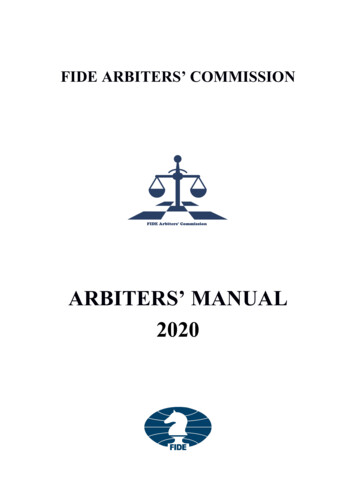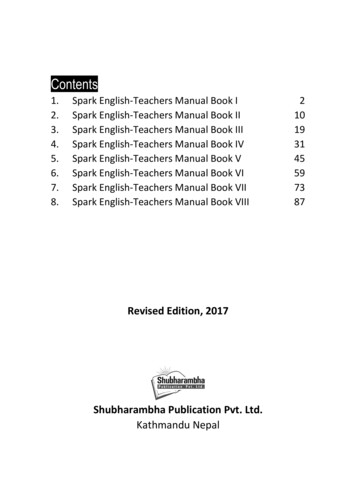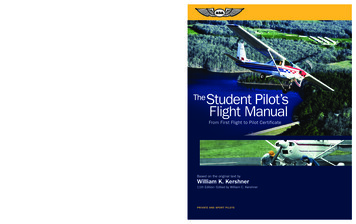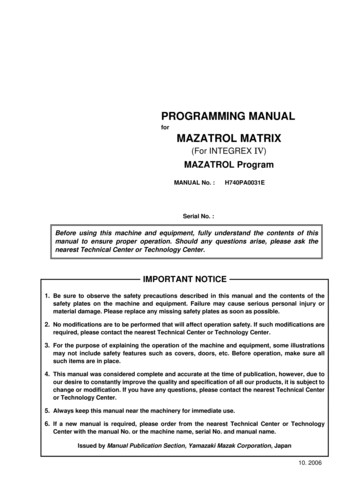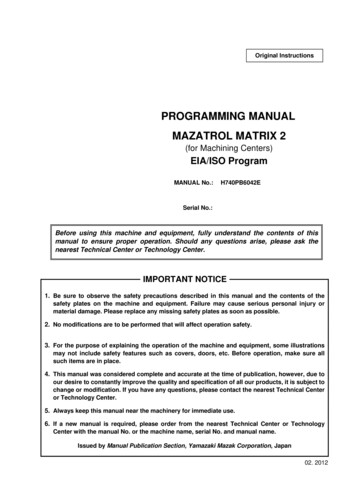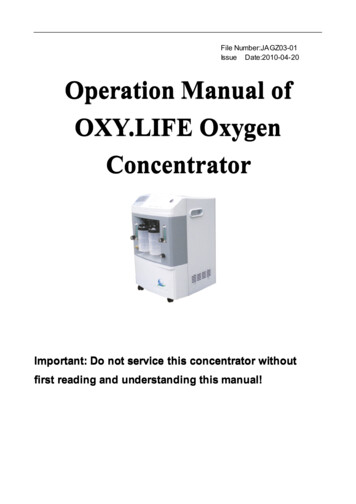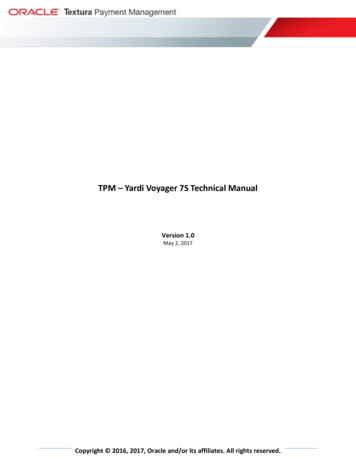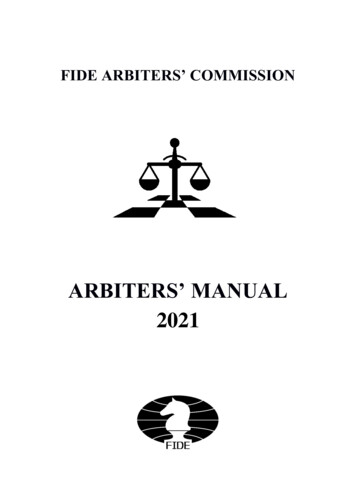
Transcription
FIDE ARBITERS’ COMMISSIONARBITERS’ MANUAL2021
ii
iii
INTRODUCTIONDear fellow arbiters, dear friends,This manual is yours!Since the first edition published in 2013, the Arbiters' Manual has been a reference forthousands of chess arbiters worldwide. It has been evolving over time, addingregulations, sharing examples or comments, removing obsolete parts.Year after year, it has been aggregating the experience of colleagues passionatelyinvesting their energy in making the manual better! More than a teamwork, our manualis a concrete illustration of the FIDE motto: Gens Una Sumus – we are one family. Onefamily with other commissions who produce regulations that we have to apply intournaments; and especially with arbiters sharing various views or feedback. Thank youall for your contribution in helping our sector to grow!This edition contains 2 new chapters: FIDE Online Chess regulations with commentsand sample exam questions for FIDE arbiters. Those are 2 practical topics and theCommission hopes that they will help readers in their arbiter's activities and training!Our team also took some time to review comments and interpretations, so that youbenefit from better added value when studying the subjects.For all these reasons, the FIDE Arbiters' Commission is proud to release the Arbiter'sManual 2021!Wishing you good reads and even better tournaments!Laurent FREYDChairmanFIDE Arbiters’ Commissioniv
Revisions listVersion NumberDateChanges0001 Oct 2017Initial Version0131 Dec 20172018 version,FIDE laws changes taking effect from January2018 (Articles 7.5, 7.6, 7.7, 7.8, A.4.2, A.4.3,A.4.5)Addition: Guidelines for the organisersFIDE Swiss Rules C.04.2.A: the wholesection has been rewritten, C.04.2.B.3: aclarification0201 Sep 2018Some minor grammatical corrections,New Anti-cheating guidelines for Arbiters,Title norms example correction0301 July 2019Some minor grammatical correctionsGeneralRulesandTechnicalRecommendations for TournamentsNew General Regulations for CompetitionsAddition: Regulations for the classification ofthe Chess Arbiters04April 2020Some minor grammatical correctionsReorder chaptersRevise some of interpretationsFIDE Rapid and Blitz Rating RegulationsNew Standards of Chess Equipment, Venue,for FIDE Tournaments, Rate of Play and Tiebreak RegulationsNew General Rules and TechnicalRecommendations for Tournaments05March 2021Addition: FIDE Online Regulations (Chapter 13)Notes by Professor Ken Regan on theapplication of Statistical EvidenceSample Exam Questions for FIDE Arbiters(Chapter 14)New commentsinterpretations.andupdateprevious
ContentsContents. viiCHAPTER 1: THE ROLE OF THE ARBITERS AND THEIR DUTIES . 1Summary of the general duties of an Arbiter . 2CHAPTER 2: THE FIDE LAWS OF CHESS (E01) .5A Brief History of the Laws of Chess . 5INTRODUCTION . 7PREFACE . 7BASIC RULES OF PLAY . 8Article 1: The nature and objectives of the game of chess . 8Article 2: The initial position of the pieces on the chessboard . 9Article 3: The moves of the pieces . 11Article 4: The act of moving the pieces . 16Article 5: The completion of the game . 19COMPETITION RULES . 20Article 6: The Chessclock . 20Article 7: Irregularities . 26Article 8: The recording of the moves . 29Article 9: The drawn game . 31Article 10: Points . 34Article 11: The conduct of the players . 35Article 12: The role of the Arbiter (see Preface) . 38APPENDICES . 40Appendix A. Rapid chess . 40Appendix B. Blitz . 42Appendix C. Algebraic notation . 43Appendix D. Rules for play with blind and visually disabled players . 46Guidelines . 49Guidelines I. Adjourned games . 49Guidelines II. Chess960 Rules . 51Guidelines III. Games without increment including Quickplay Finishes . 53Glossary of terms in the Laws of Chess . 55CHAPTER 3: ANTI-CHEATING GUIDELINES (B06 ANNEX 6) . 60Recommendations for Arbiters . 601.How breaches of AC regulations may occur during the game: . 61vii
2.Applicable precautions: . 613.Screening games for precaution and information: . 624.How to deal with suspicious behavior: . 625.How to deal with the new Article 11. 3. 3 of the Laws of Chess: . 636.How to deal with accusations: . 64Notes by Professor Ken Regan on the application of Statistical Evidence . 65I. Purposes of Statistical Results . 65II. Statistical Tests . 65III. Types of Arbiter Actions . 66IV. Instructions for Using Statistical Evidence . 66V. Process Apart From Observational Evidence . 67VI. Instructions for Considering Complaints . 67VII. Instructions for Evaluating Complaints . 68VIII. On-Site Judgments and Further Steps . 69CHAPTER 4: TYPES OF TOURNAMENTS. 701. Round Robin System . 702. Swiss Systems . 713. Scheveningen System . 734. Skalitzka System . 765. Other systems . 775.1 Matches . 775.2 Knock‐out . 77CHAPTER 5: FIDE SWISS RULES (C04) . 78Basic rules for Swiss Systems (C04.1) . 78General handling rules for Swiss Tournaments (C.04.2) . 79A.Pairing Systems . 79B.Initial Order . 80C.Late Entries. 81D.Pairing, colour and publishing rules . 82FIDE (Dutch) System (C04.3) . 83A.Introductory Remarks and Definitions . 83BPairing Process for a bracket . 86CPairing Criteria . 89DRules for the sequential generation of the pairings . 91EColour Allocation rules . 92viii
FIDE-approved Accelerated Systems (C04.5) . 93Baku Acceleration . 94CHAPTER 6: FIDE RATINGS (B02). 95FIDE Rating Regulations (B02) . 950.Introduction . 951.Rate of Play . 962.Laws to be followed . 963.Playing Time per Day . 964.Duration of the Tournament: . 965.Unplayed Games . 966.Composition of the Tournament . 977.Official FIDE Rating List . 978.The working of the FIDE Rating System. 999.Reporting Procedures . 10210.Monitoring the Operation of the Rating System . 10211.The requirements for the FIDE Rating System Administrator . 10212.Some comments on the Rating system . 10313.Inclusion in the Rating list . 103CHAPTER 7: FIDE RAPID AND BLITZ RATING REGULATIONS (B02) . 1040.Introduction . 1041.Rate of Play . 1042.Laws to be followed . 1053.Number of rounds per Day . 1054.Duration of the Tournament . 1055.Unplayed Games . 1066.Composition of the Tournament . 1067.Official FIDE Rapid and Blitz Rating Lists . 1078.The working of the FIDE Rating System for Rapid and Blitz ratings . 1099.Reporting Procedures . 11110.Monitoring the Operation of the Rating System . 11211.The requirements for the FIDE Rating System Administrator . 11212.Inclusion in the Rating list . 112CHAPTER 8: INTERNATIONAL TITLE REGULATIONS (B01) . 1130.Introduction . 1131.Requirements for titles designated in 0.31 . 115ix
2.Application Forms for titles are annexed hereto. They are: . 1323.List of Application Forms . 133CHAPTER 9: STANDARDS OF CHESS EQUIPMENT, VENUE FOR FIDE TOURNAMENTS, RATE OFPLAY AND TIE-BREAK REGULATIONS (C02). 1341.Chess Equipment . 1342.Chess Pieces . 1343.Chess boards . 1364.Chess tables . 1375.Chess clocks . 1377.Testing Clocks and equipment . 1418.Tournament halls for the FIDE World or Continental Championships and Olympiads1419.Broadcasting . 14410.Requirements on treatment of disabled chess players . 14411.Requirements on treatment of school tournaments . 14712.Rate of play - time controls . 15113.Tie-Break Regulations . 15213.17.Details of Berger table . 15913.18 Details of Varma Tables. 163CHAPTER 10: GENERAL REGULATIONS FOR COMPETITIONS (C05) . 164Preface . 1641.Scope . 1642.The Chief Organiser (CO) . 1643.The Chief Arbiter (CA) . 1654.Preparation of the Playing Hall and Chess Equipment . 1665.Pairings . 1666.Drawing of lots and withdrawals . 1667.Team competitions & Team Captain’s Role . 1688.Tie-breaks and unplayed games . 1709.Conduct of the Players . 17010.Appeals procedure . 17011.Media. 17112.Invitation, Registration and Functions for L1 tournaments . 17113.Appointments of CA for L1 tournaments . 173CHAPTER 11: REGULATIONS FOR THE TITLES OF ARBITERS (B06) . 174x
1.Introduction . 1742.General Regulations . 1753.Requirements for the title of FIDE Arbiter . 1764.Requirements for the title of International Arbiter . 1775.Application Procedure. 1786.Arbiters’ Licence . 179CHAPTER 12: REGULATIONS FOR THE CLASSIFICATION OF CHESS ARBITERS (B06 ANNEX 2) . 1801.General . 1802.Inactive IA and FA. 1803.Active IA and FA . 1804.Procedure for the classification of IA and FA . 1825.Appointment of the IA and FA, according to their Categories . 182CHAPTER 13: FIDE ONLINE CHESS REGULATIONS . 183Introduction . 183Part I: Basic Rules of Play . 183Article 1: Application of the FIDE Laws of Chess . 183Part II: Online Chess Rules . 184Article 2: Playing Zone . 184Article 3: Moving the Pieces on the Virtual Chessboard . 185Article 4: Virtual Chessclock . 186Article 5: Completing the Game . 186Part III: Regulations for Online Competitions . 187Article 6: Competition Types . 187Article 7: Scoring System . 187Part III a: Regulations for Online Competitions with Supervision . 188Article 8: General Provisions . 188Article 9: Players’ Conduct . 188Article 10: The Arbiter’s Role . 190Article 11: Disconnections . 191Article 12: Playing Device . 192Article 13: Video Conferencing System . 192Article 14: Cameras and Microphones . 193Article 15: Irregularities . 194Part III b: Regulations for Hybrid Chess Competitions . 195Article 16: General Provisions . 195xi
Article 17: Players’ Conduct . 196Article 18: The Arbiter’s Role . 197Article 19: Irregularities . 198Article 20: Use of Traditional Chess Sets at Hybrid Competitions . 199APPENDIX I. FIDE Fair Play Rules for Online Competitions with Supervision . 200A. General Provisions . 200B. Online Cheating Offences. 201C. Burdens and Standards of Proof. 202D. False Accusation . 202E. Sanctions . 202F. Jurisdiction . 203G. Complaints and Investigations . 203H. Investigation Procedure . 204I. Procedural Rules. 204J. Condition of Entry in an Online Sports Event . 205APPENDIX II. Rules for Significantly/Totally Blind and Unable to Move Disabled ChessPlayers for Online Competitions with Supervision . 206Appendix III. Regulations for Significantly/Totally Blind and Unable to Move Chess Playersfor Hybrid Competitions . 207Glossary of Terms in the FIDE Online Chess Regulations . 208CHAPTER 14: SAMPLE EXAM QUESTIONS FOR FIDE ARBITERS . 210Laws . 211Rating & Titles . 214Swiss Pairing . 216Competition Rules . 217Systems and Tie Breaks . 218Anti-Cheating . 218Arbiter Titles . 219Answers . 219APPENDIXES . 224Example of a rating calculation . 224Guideline for checking if a players’ result is a valid title norm: . 225Some examples of title norms calculations: . 227Awarding of money prizes . 229Manual checking of computer pairings . 231xii
Example of a “Time Control Sheet”: . 232Application Forms: . 234IA1 – International Arbiter Norm Report Form . 234IA2 – Application form for the award of the title of International Arbiter . 235FA1 – FIDE Arbiter Norm Report Form . 236FA2 – Application form for the award of the title of FIDE Arbiter . 237FL1 – FIDE Lecturer Norm Report Form . 238FL2 – Application form for FIDE Lecturer . 239IT1 – Certificate of Title Result (Title Norm) . 240IT2 – Title Application Form . 241IT3 – Tournament Report Form . 242Anti-cheating Tournament Report Form. 243Anti-cheating Post Tournament Report Form . 245Table for Direct Titles effective from 1 July 2017 . 247Table 1.24a . 247Table 1.24b . 248IMPORTANT:Throughout this manual, text which appears in a box such as this one is given as advice and isthe opinion of a number of experienced arbiters. It does not form part of the Laws nor theRegulations in which it appears.xiii
CHAPTER 1: THE ROLE OF THE ARBITERS AND THEIR DUTIESThis chapter is written by the FIDE Arbiters’ Commission and is very important forarbiters but does not form part of FIDE Handbook.The Arbiters are the link between the organiser and the players of a tournament.We, the arbiters, have not only to supervise the games ensuring the Laws of Chess arefollowed, but also to ensure the best conditions for the players who should not bedisturbed and will be able to play without any difficulties. Therefore, we have to takecare of the playing area, the equipment, the environment and the whole playing venue.In addition, we must always remain aware of the potential for cheating.The general duties of the Arbiters in a competition are described in the Laws of Chess(Art. 12) and are:a. To see that the Laws of Chess are observed.b. To ensure fair play and must follow the Anti-cheating regulations. This means thatwe also must take care to prevent any cheating by th
This edition contains 2 new chapters: FIDE Online Chess regulations with comments and sample exam questions for FIDE arbiters. Those are 2 practical topics and the Commission hopes that they will help readers in their arbiter's activities and training! Our team also took some
